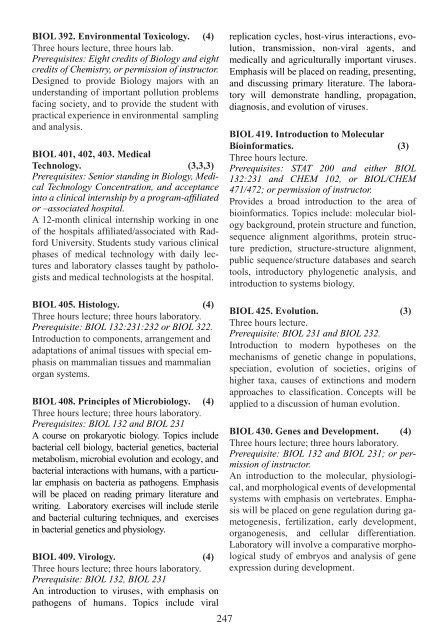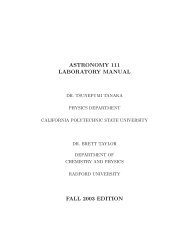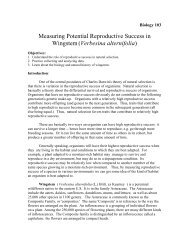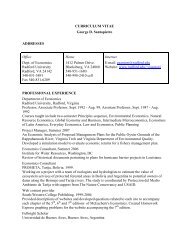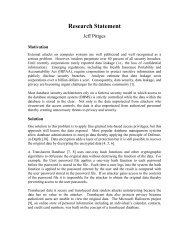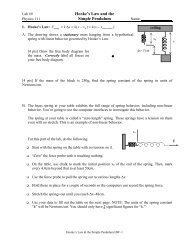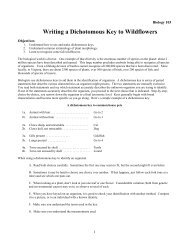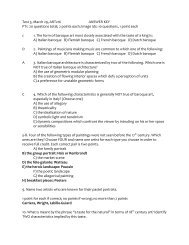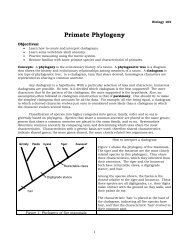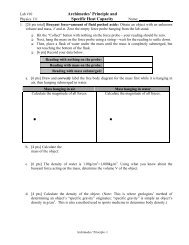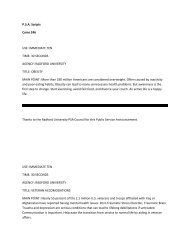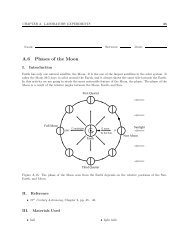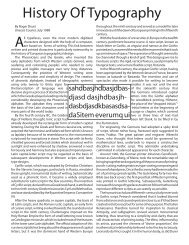Radford University Undergraduate Catalog, 2011-2012
Radford University Undergraduate Catalog, 2011-2012
Radford University Undergraduate Catalog, 2011-2012
You also want an ePaper? Increase the reach of your titles
YUMPU automatically turns print PDFs into web optimized ePapers that Google loves.
BIOL 392. Environmental Toxicology. (4)<br />
Three hours lecture, three hours lab.<br />
Prerequisites: Eight credits of Biology and eight<br />
credits of Chemistry, or permission of instructor.<br />
Designed to provide Biology majors with an<br />
understanding of important pollution problems<br />
facing society, and to provide the student with<br />
practical experience in environmental sampling<br />
and analysis.<br />
BIOL 401, 402, 403. Medical<br />
Technology. (3,3,3)<br />
Prerequisites: Senior standing in Biology, Medical<br />
Technology Concentration, and acceptance<br />
into a clinical internship by a program-affiliated<br />
or –associated hospital.<br />
A 12-month clinical internship working in one<br />
of the hospitals affiliated/associated with <strong>Radford</strong><br />
<strong>University</strong>. Students study various clinical<br />
phases of medical technology with daily lectures<br />
and laboratory classes taught by pathologists<br />
and medical technologists at the hospital.<br />
replication cycles, host-virus interactions, evolution,<br />
transmission, non-viral agents, and<br />
medically and agriculturally important viruses.<br />
Emphasis will be placed on reading, presenting,<br />
and discussing primary literature. The laboratory<br />
will demonstrate handling, propagation,<br />
diagnosis, and evolution of viruses.<br />
BIOL 419. Introduction to Molecular<br />
Bioinformatics. (3)<br />
Three hours lecture.<br />
Prerequisites: STAT 200 and either BIOL<br />
132:231 and CHEM 102, or BIOL/CHEM<br />
471/472; or permission of instructor.<br />
Provides a broad introduction to the area of<br />
bioinformatics. Topics include: molecular biology<br />
background, protein structure and function,<br />
sequence alignment algorithms, protein structure<br />
prediction, structure-structure alignment,<br />
public sequence/structure databases and search<br />
tools, introductory phylogenetic analysis, and<br />
introduction to systems biology.<br />
BIOL 405. Histology. (4)<br />
Three hours lecture; three hours laboratory.<br />
Prerequisite: BIOL 132:231:232 or BIOL 322.<br />
Introduction to components, arrangement and<br />
adaptations of animal tissues with special emphasis<br />
on mammalian tissues and mammalian<br />
organ systems.<br />
BIOL 408. Principles of Microbiology. (4)<br />
Three hours lecture; three hours laboratory.<br />
Prerequisites: BIOL 132 and BIOL 231<br />
A course on prokaryotic biology. Topics include<br />
bacterial cell biology, bacterial genetics, bacterial<br />
metabolism, microbial evolution and ecology, and<br />
bacterial interactions with humans, with a particular<br />
emphasis on bacteria as pathogens. Emphasis<br />
will be placed on reading primary literature and<br />
writing. Laboratory exercises will include sterile<br />
and bacterial culturing techniques, and exercises<br />
in bacterial genetics and physiology.<br />
BIOL 409. Virology. (4)<br />
Three hours lecture; three hours laboratory.<br />
Prerequisite: BIOL 132, BIOL 231<br />
An introduction to viruses, with emphasis on<br />
pathogens of humans. Topics include viral<br />
247<br />
BIOL 425. Evolution. (3)<br />
Three hours lecture.<br />
Prerequisite: BIOL 231 and BIOL 232.<br />
Introduction to modern hypotheses on the<br />
mechanisms of genetic change in populations,<br />
speciation, evolution of societies, origins of<br />
higher taxa, causes of extinctions and modern<br />
approaches to classification. Concepts will be<br />
applied to a discussion of human evolution.<br />
BIOL 430. Genes and Development. (4)<br />
Three hours lecture; three hours laboratory.<br />
Prerequisite: BIOL 132 and BIOL 231; or permission<br />
of instructor.<br />
An introduction to the molecular, physiological,<br />
and morphological events of developmental<br />
systems with emphasis on vertebrates. Emphasis<br />
will be placed on gene regulation during gametogenesis,<br />
fertilization, early development,<br />
organogenesis, and cellular differentiation.<br />
Laboratory will involve a comparative morphological<br />
study of embryos and analysis of gene<br />
expression during development.


